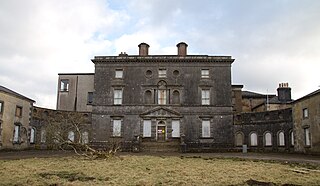This is an incomplete list of people who served as Lord Lieutenant of Denbighshire in Wales. After 1733, all Lord Lieutenants were also Custos Rotulorum of Denbighshire. The office was abolished on 31 March 1974, being replaced by the Lord Lieutenant of Clwyd.
This is a list of people who have served as Custos Rotulorum of Anglesey.
This is a list of people who have served as Custos Rotulorum of Denbighshire.
This is a list of people who have served as Custos Rotulorum of Pembrokeshire.
This is a list of people who have served as Custos Rotulorum of Merionethshire.
Events from the year 1755 in Ireland.
John Arthur Wynne PC was an Irish landowner and politician.
The High Sheriff of Leitrim was the British Crown's judicial representative in County Leitrim, Ireland from c.1584 until 1922, when the office was abolished in the new Free State and replaced by the office of Leitrim County Sheriff. The sheriff had judicial, electoral, ceremonial and administrative functions and executed High Court Writs. In 1908, an Order in Council made the Lord-Lieutenant the Sovereign's prime representative in a county and reduced the High Sheriff's precedence. However the sheriff retained his responsibilities for the preservation of law and order in the county. The usual procedure for appointing the sheriff from 1660 onwards was that three persons were nominated at the beginning of each year from the county and the Lord Lieutenant then appointed his choice as High Sheriff for the remainder of the year. Often the other nominees were appointed as under-sheriffs. Sometimes a sheriff did not fulfil his entire term through death or other event and another sheriff was then appointed for the remainder of the year. The dates given hereunder are the dates of appointment. All addresses are in County Leitrim unless stated otherwise.
The High Sheriff of Sligo was the British Crown's judicial representative in County Sligo, Ireland from the 16th century until 1922, when the office was abolished in the new Free State and replaced by the office of Sligo County Sheriff. The sheriff had judicial, electoral, ceremonial and administrative functions and executed High Court Writs. In 1908, an Order in Council made the Lord-Lieutenant the Sovereign's prime representative in a county and reduced the High Sheriff's precedence. However the sheriff retained his responsibilities for the preservation of law and order in the county. The usual procedure for appointing the sheriff from 1660 onwards was that three persons were nominated at the beginning of each year from the county and the Lord Lieutenant then appointed his choice as High Sheriff for the remainder of the year. Often the other nominees were appointed as under-sheriffs. Sometimes a sheriff did not fulfil his entire term through death or other event and another sheriff was then appointed for the remainder of the year. The dates given hereunder are the dates of appointment. All addresses are in County Sligo unless stated otherwise.
Owen Wynne was an Irish landowner and politician.
Lieutenant-General Owen Wynne (1665–1737) was an Irish officer in the British Army, and a member of the Parliament of Ireland.

Hazelwood House is an 18th-century Palladian style country house located in a 70-acre (28 ha) demesne in the parish of Calry, some 2 miles (3 km) south-east of the town of Sligo in north-west Ireland. It has been described as one of County Sligo's most neglected treasures. In addition to its architectural value, the house is important both socially and historically.
The Custos Rotulorum of King's County was the highest civil officer in King's County, Ireland. The position was later combined with that of Lord Lieutenant of King's County.
The Custos Rotulorum of Tyrone was the highest civil officer in County Tyrone, Ireland. The position was later combined with that of Lord Lieutenant of Tyrone.
Owen Wynne was an Irish Member of Parliament. He sat in the House of Commons of Ireland from 1749 to 1789.
Owen Wynne was an Irish Member of Parliament. He sat in the House of Commons of Ireland from 1713 to 1756.

